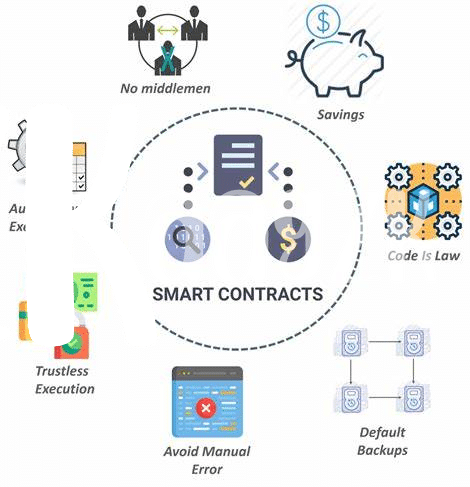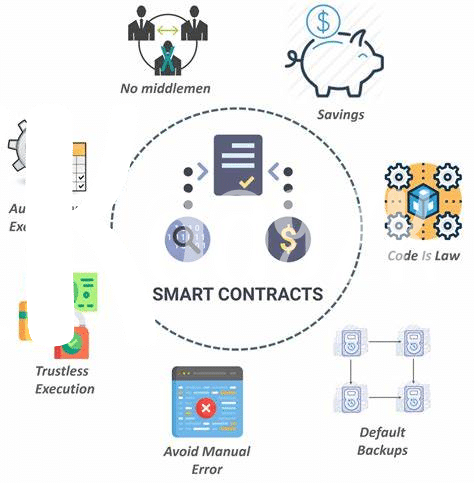🌐 What Is a Smart Contract? Unraveling the Basics

Imagine unlocking a treasure chest with a magical key that only you possess. That’s a bit like a smart contract, a type of agreement that lives on the internet, specifically in what’s called the blockchain. It’s a bit like a traditional contract, but with a twist: it automatically does stuff once certain conditions are met, no need for a middleman. Imagine you’re selling a bike; once the buyer pays the set amount, the contract instantly makes sure the ownership changes hands. It’s not just talk; it’s action!
Now, how exactly does this magic work? Think about it like a vending machine. You choose your snack, pay the right amount, and voilà, your choice pops out. Smart contracts operate on a similar principle, but instead of snacks, they handle agreements and transactions. They’re built using a special kind of code that says, “If this happens, then do that,” ensuring everything is fair and square without having someone to oversee it. It’s like having an unbiased robot making sure everyone sticks to their promises.
| Feature | Smart Contract | Traditional Contract |
|---|---|---|
| Operation | Automatic | Manual |
| Execution Speed | Instant | Can be delayed |
| Intermediary | None | Often required |
| Trust Factor | High (programmatic) | Varies (human-dependent) |
✍️ How Smart Contracts Work: a Simple Breakdown
Imagine you have a magical notebook where you write down an agreement with a friend to buy their bike. Once you both agree to the terms, like the price and the date of exchange, this magic notebook makes sure everything happens exactly as written, without either of you needing to do anything more. That’s sort of how smart contracts work on the blockchain. They’re like self-executing contracts with the terms of the agreement directly written into lines of code. The beauty of these contracts is that they run automatically when conditions are met, without needing a middleman. This means less waiting, less cost, and less room for error or dishonesty. Whether it’s buying a bike or selling a house, smart contracts make it so the deal goes through the minute all agreed-upon conditions are satisfied. For those curious about the broader implications of blockchain technology beyond financial transactions, considering its potential in enhancing privacy and security is fascinating. Discover more about this at https://wikicrypto.news/beyond-currency-blockchains-diverse-applications-unveiled.
💡 Smart Contracts Vs Traditional Contracts: Spot the Difference

Imagine agreeing on something with a friend. You both jot down what you’ve agreed on a piece of paper, sign it, and maybe even shake on it. That’s a bit like a traditional contract – it’s an agreement between people or companies that’s recognized by everyone else. Now, what if instead of pen and paper, you use a computer program to make this agreement? And what if this program could automatically make sure both of you do what you promised without needing anyone else to check? That’s what smart contracts are all about. They live on the blockchain, a kind of digital ledger, and they work without needing a third party to keep an eye on things.
🤖📄 The key difference here is about trust and efficiency. Traditional contracts often need lawyers to set things up and courts to solve disputes, which takes time and money. Smart contracts, on the other hand, rely on the blockchain technology to automatically enforce the agreement. This means they can often be faster, cheaper, and less error-prone than the traditional way. But remember, while smart contracts sound pretty cool, they’re not perfect for every situation and come with their own set of challenges that need careful consideration.
🛠️ Building Blocks of Smart Contracts: Coding for Beginners

Entering the world of smart contracts might look like trying to solve a puzzle, but once you get the basics, you’re halfway there. Imagine you’re building a Lego house, where each block is a piece of code. In the smart contract environment, these blocks come together to create self-executing contracts. These contracts automatically enforce and execute the terms and conditions laid out within them, making them a powerful tool on the blockchain. For beginners, coding might seem daunting at first, but all it really involves is setting rules that the contract will follow. Think of it as writing down instructions for a friend to follow in your absence, but in this case, your friend is the computer.
As we dive deeper into how these blocks of code are put together, we need to be mindful of the wider implications, including bitcoin privacy concerns and the blockchain. Like constructing a sturdy house requires understanding the materials you’re using; building a smart contract requires knowing the potential risks and how to mitigate them. Fortunately, even for beginners, numerous resources and tools are available to make this journey less perplexing. It’s about piecing together the logic, step by step, to forge agreements that can revolutionize how we conduct transactions in a secure and transparent way.
🚀 Real-world Applications: Smart Contracts in Action
Imagine you’re buying a house, selling your artwork, or getting insurance. In each case, there’s a lot of back-and-forth, paperwork, and waiting around. This is where smart contracts on blockchain technology fly in like superheroes. They make these agreements quicker, cheaper, and trustier – all without needing a middleman! For instance, when buying a house, a smart contract can automatically check if you’ve paid and give you the house keys (digitally, of course) right away, skipping the weeks of waiting. Artists can sell their work directly, getting paid instantly, and buyers can be sure they’re getting the real deal. Even insurance claims can be settled faster, with payouts happening automatically if certain conditions are met, reducing fraud. Below is a quick snippet of how smart contracts are changing our world:
| Area | How Smart Contracts Help |
|---|---|
| Real Estate | Speeds up transactions and reduces paperwork. |
| Art Sales | Ensures authenticity and immediate payment. |
| Insurance | Automates claims and payouts, cutting fraud. |
In these examples, smart contracts act as trusty helpers, making sure everything goes smoothly without the usual hassle. It’s like having a super-efficient helper for your most important deals, making life a bit easier for everyone involved.
🛡️ Keeping Safe: the Risks and Protections with Smart Contracts

Venturing into the world of smart contracts is like embarking on a journey through a futuristic landscape where agreements are sealed not with a handshake but with code. However, as with any adventure, there are risks lurking amidst the opportunities. Smart contracts, while eliminating middlemen and adding efficiency, are not immune to challenges. The code that powers these contracts is as fallible as the humans who write it, making errors and vulnerabilities a real concern. These digital agreements are also permanent, meaning once something is encoded, it’s set in stone, which can be a double-edged sword. On one hand, it ensures trust and transparency; on the other, it leaves little room for error correction or dispute resolution. Fortunately, there are shields in this digital arena, ranging from thorough code audits to sophisticated security protocols, designed to protect all parties involved. Understanding these protective measures is crucial, just as it is essential to grasp the complexities and nuances of bitcoin historical price trends and the blockchain, a backbone of smart contracts, which further highlights the importance of diligence and education in navigating this cutting-edge technology. Embracing smart contracts means preparing not only to reap their benefits but also to shield oneself from their potential pitfalls, ensuring a future where digital agreements foster security, trust, and efficiency.
